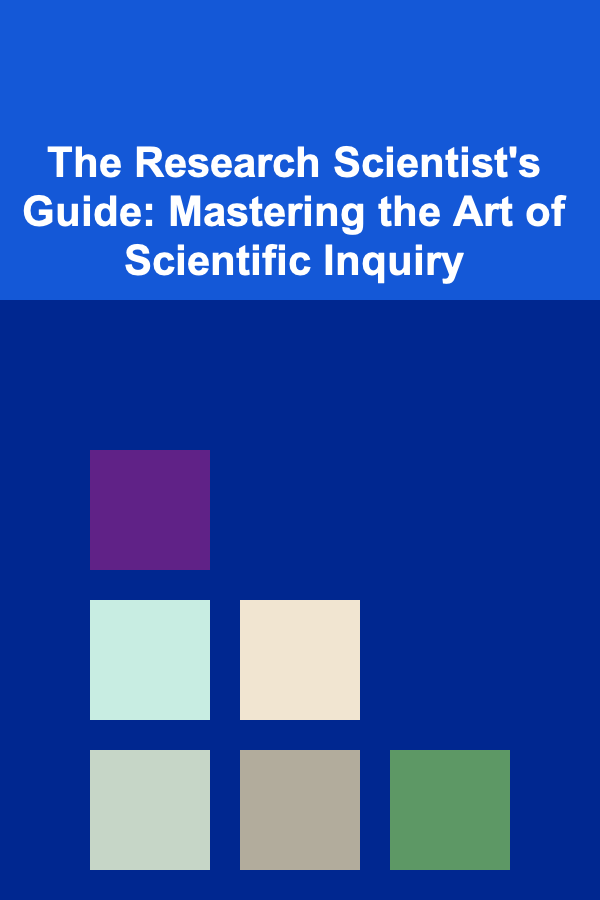
The Research Scientist's Guide: Mastering the Art of Scientific Inquiry
ebook include PDF & Audio bundle (Micro Guide)
$12.99$11.99
Limited Time Offer! Order within the next:

Scientific inquiry is the backbone of innovation and discovery. It shapes the world around us, influencing technology, medicine, society, and our understanding of the universe. For researchers, the journey of scientific inquiry is a multifaceted process that requires a combination of critical thinking, creativity, persistence, and the ability to navigate complex systems of knowledge. However, mastering this art goes beyond technical expertise and understanding research methodologies. It involves a deep commitment to problem-solving, the ability to stay curious, and a mindset that embraces failure as part of the process.
In this guide, we will explore actionable steps for mastering the art of scientific inquiry, touching on various aspects such as research design, critical thinking, creativity, collaboration, and effective communication. Whether you're a seasoned scientist or just beginning your academic journey, this guide is meant to provide insight and strategies that can help you elevate the impact of your research.
Cultivating a Curious and Open Mindset
At the heart of scientific inquiry lies curiosity---the innate desire to understand how things work, why they are the way they are, and what can be discovered if we dig deeper. Cultivating a curious mindset allows you to explore new ideas, challenge existing paradigms, and think creatively about potential solutions to problems. Here's how you can develop this mindset:
Embrace Uncertainty
The world of science is filled with unanswered questions and mysteries. Embrace the uncertainty and view it as an opportunity for discovery. Rather than fearing the unknown, approach it with excitement and a willingness to explore what lies ahead. Scientific progress often starts when we ask bold, difficult questions and refuse to accept surface-level explanations.
- Actionable Tip: Make a habit of asking "why" or "how" at the beginning of any project. Reflect on what you know and identify areas that need further exploration or clarification.
Stay Open to New Ideas
Being open-minded is essential for scientific progress. It allows you to challenge your assumptions, consider new perspectives, and adapt your approach when necessary. While it's easy to get caught up in a fixed mindset, successful scientists are those who continually reassess their theories and methodologies based on new evidence.
- Actionable Tip: Regularly review current literature from both within and outside your field. Exposure to different viewpoints, research techniques, and unexpected ideas can spark creativity and innovation.
Crafting a Solid Research Design
Good research starts with a well-thought-out design. It's the foundation upon which everything else is built, from data collection to analysis. A solid research design helps ensure that your project is methodologically sound, achievable, and able to answer the research questions effectively.
Define Clear Research Questions
Before diving into experiments, it's essential to define your research questions with clarity and precision. The questions you pose will shape your entire approach, from hypothesis formulation to data analysis.
- Actionable Tip: Break your main question into smaller, manageable sub-questions that can be explored systematically. This allows you to tackle complex problems in a step-by-step manner.
Choose the Right Methodology
The methodology you select will depend on the nature of your research questions and the resources available. Whether you're conducting qualitative interviews, laboratory experiments, or computational simulations, your methods should align with the objectives of your research.
- Actionable Tip: When choosing a methodology, consider its strengths and limitations. For example, if you're working with large datasets, you may need advanced statistical tools or machine learning techniques. For qualitative research, consider using frameworks like grounded theory or thematic analysis.
Plan for Feasibility and Ethics
While your research design should be ambitious, it should also be feasible within the time and resource constraints you have. Additionally, ethical considerations should always be at the forefront of your design process. Ensure that your research respects participants' privacy, follows safety protocols, and adheres to institutional guidelines.
- Actionable Tip: Develop a timeline that includes key milestones and resources. Consult with ethics committees, especially if your research involves human or animal subjects, to ensure compliance with ethical standards.
Mastering Data Collection and Analysis
Once the research design is in place, the next critical step is data collection and analysis. These processes form the core of your research and can often make or break your findings. Effective data management and analysis are essential to deriving meaningful conclusions from your experiments.
Collect Accurate and Reliable Data
Accurate data collection is fundamental to the credibility of your research. Regardless of the tools or techniques you use, ensure that you collect data consistently and that it accurately represents the variables you're studying.
- Actionable Tip: Use standardized procedures for data collection and, if possible, automate processes to reduce human error. Keep detailed records of every experiment or observation, including environmental conditions, equipment used, and any unexpected events that may have influenced results.
Analyze Data with Precision
Once the data is collected, it's time to analyze it. Whether you're performing statistical analysis, qualitative coding, or computational modeling, ensure your methods are rigorous and aligned with your research questions. Data analysis should be conducted thoughtfully and without bias.
- Actionable Tip: Learn advanced analytical tools relevant to your field, such as machine learning algorithms, statistical software (e.g., R, SPSS), or qualitative analysis programs (e.g., NVivo). Also, ensure that you understand the assumptions behind the models you use.
Address Potential Biases
Bias can creep into every stage of research, from data collection to analysis and interpretation. Recognizing and mitigating potential biases is critical for ensuring that your conclusions are valid.
- Actionable Tip: Conduct your research in a way that minimizes bias. Use blinding techniques in experimental designs, ensure random sampling, and always double-check your data for outliers or inconsistencies.
Navigating the Challenges of Failure
Failure is an integral part of the scientific process. Not every hypothesis will prove correct, and not every experiment will yield the expected results. However, how you respond to failure will determine the trajectory of your research.
Learn from Setbacks
Rather than seeing failure as a setback, view it as an opportunity for learning and growth. Each failure teaches you something about the hypothesis, methodology, or the variables you're studying. Great scientists embrace failure as a means of refining their approach.
- Actionable Tip: After each failed experiment or negative result, ask yourself what you learned. What could be improved next time? How can the failure inform your next steps?
Maintain Resilience and Persistence
Scientific discovery requires perseverance. It's essential to maintain resilience when things don't go as planned. This mental strength allows you to keep going, even when the research journey feels overwhelming.
- Actionable Tip: Develop a support network of peers, mentors, or collaborators who can provide guidance during difficult times. Take breaks when needed, but return to your research with renewed energy and a positive outlook.
Fostering Effective Collaboration
Collaboration is a key component of modern scientific research. Many complex problems require multidisciplinary teams with diverse expertise. However, effective collaboration requires clear communication, respect for diverse viewpoints, and a shared commitment to the research objectives.
Build a Strong Research Team
A research team should consist of individuals with complementary skills and expertise. As a leader, it's essential to foster an environment of trust and mutual respect where team members feel comfortable contributing their ideas and insights.
- Actionable Tip: When building your research team, look for people who have different perspectives, backgrounds, and areas of expertise. This diversity can lead to innovative solutions and ideas.
Communicate Clearly and Frequently
Frequent and transparent communication is essential to ensure that all team members are aligned with the research objectives. Regular meetings, updates, and discussions help keep everyone on track and allow for the early identification of potential issues.
- Actionable Tip: Set up a collaborative platform (e.g., Slack, Microsoft Teams) where your team can easily communicate, share resources, and track progress on tasks. Hold regular check-ins to discuss challenges and next steps.
Communicating Your Findings
The ultimate goal of research is to communicate your findings to the broader scientific community, policymakers, and the public. Effective communication ensures that your work has an impact and that others can build on your discoveries.
Publish in High-Impact Journals
Publishing in peer-reviewed journals is one of the most effective ways to share your research with the academic community. Choose journals that are well-regarded in your field, and ensure that your manuscript is thoroughly prepared and meets the journal's submission requirements.
- Actionable Tip: Before submitting, carefully proofread your manuscript for clarity, accuracy, and proper citation. Consider using writing tools like Grammarly or seeking feedback from colleagues to ensure your paper is well-written.
Present at Conferences and Seminars
Conferences provide an opportunity to share your findings with peers, get feedback, and engage in discussions that can shape future research. Presenting at conferences also helps you network with other researchers and stay updated on the latest trends in your field.
- Actionable Tip: Prepare concise and visually appealing presentations for conferences. Practice your talks multiple times and be ready to answer questions from a variety of perspectives.
Engage with Broader Audiences
In addition to academic audiences, aim to share your findings with the broader public. This can involve writing blog posts, creating infographics, or participating in outreach activities that make your research accessible to non-experts.
- Actionable Tip: Use social media platforms (e.g., Twitter, LinkedIn) to share key insights from your research. Consider writing a popular science article for a magazine or contributing to online discussions that highlight the relevance of your work.
Conclusion
Mastering the art of scientific inquiry is an ongoing journey of discovery, learning, and growth. It requires a combination of curiosity, critical thinking, creativity, collaboration, and effective communication. By focusing on these areas and adopting a strategic approach to research design, data analysis, failure management, and collaboration, you can elevate the quality and impact of your research.
Remember, scientific inquiry is not just about finding answers---it's about asking the right questions, challenging existing assumptions, and pushing the boundaries of knowledge. As a researcher, you are not just contributing to your field, but shaping the future of science and society.

How to Build a Passive Income Stream Through Investments
Read More
How to Clean Your Home After a DIY Home Renovation
Read More
Mastering Financial Planning: Advanced Techniques for Building Lasting Financial Security
Read More
Mastering Patent Law: A Comprehensive Guide for Patent Attorneys
Read More
How To Create a Flexible Work Schedule for FIRE
Read More
Choosing the Best Portable Power Bank for Camping
Read MoreOther Products

How to Build a Passive Income Stream Through Investments
Read More
How to Clean Your Home After a DIY Home Renovation
Read More
Mastering Financial Planning: Advanced Techniques for Building Lasting Financial Security
Read More
Mastering Patent Law: A Comprehensive Guide for Patent Attorneys
Read More
How To Create a Flexible Work Schedule for FIRE
Read More